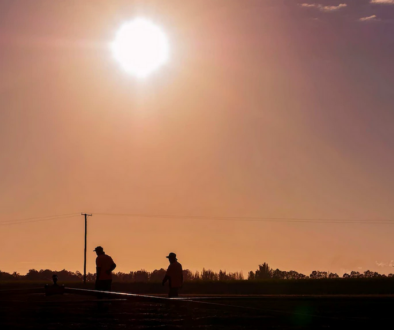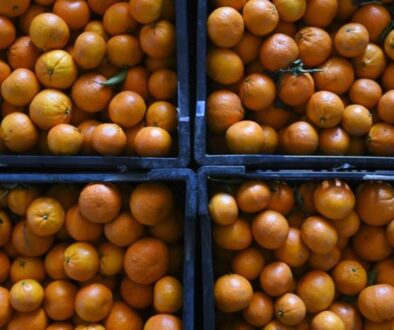
Contractor allegedly involved in PALM scheme rort
Originally published on couriermail.com.au written by Angeline Lowther
An interstate human rights law firm and Queensland motel manager have joined forces to help vulnerable farm workers after the motel manager discovered her guests were living off a few dollars a week.
Ni-Vanuatu farm workers living and working in Bundaberg have sought urgent assistance to have their visas restored under the PALM Scheme after they claim they were induced by non-approved employment firm to work illegally.
It’s alleged an interstate-based contractor “exploited” the workers after they came to Australia to work and make money to send home to their families in Vanuatu.
At least 50 workers claim the contractor has “exploited” them.
South Sea Islander man, Alan, said the Bundaberg farmworker community felt like history had repeated itself, and they were being used like their ancestors who were blackbirded to Australia under false promises in the late 1800s.
“They were slaves,” he said.
“I just want to say that we are not robots, we are not slaves, we want to be treated like Australian people who work.”
HISTORY OF SOUTH SEA ISLANDER TREATMENT IN AUSTRALIA
“Blackbirding” first occurred from the year 1863 and was the term given to South Sea Islander men and women who were coerced, tricked and kidnapped and brought to countries distant to their native land to live a life of servitude under harsh conditions.
Many islanders died from living in poor conditions and forced into slave labour,with many rarely being fed, or only provided with tiny rations.
The Pacific Island Labourers Act was legislated in 1901, which made it illegal to import South Sea Islanders after March 1904.
The Australian Government welcomed islanders back through the Seasonal Worker Program (SWP) created in 2012 that would see them able to come to Australia for labour work.
After allegations of slave-lie conditions in the Queensland agricultural sector, the Australian Government introduced the Modern Slavery Act 2018.
HUSHED DEPARTMENT OF FOREIGN AFFAIRS TRIP TO BUNDABERG
Department of Foreign Affairs representatives swooped on the Bundaberg region in June 2022, after a local businesswoman made a complaint about the treatment of visiting workers.
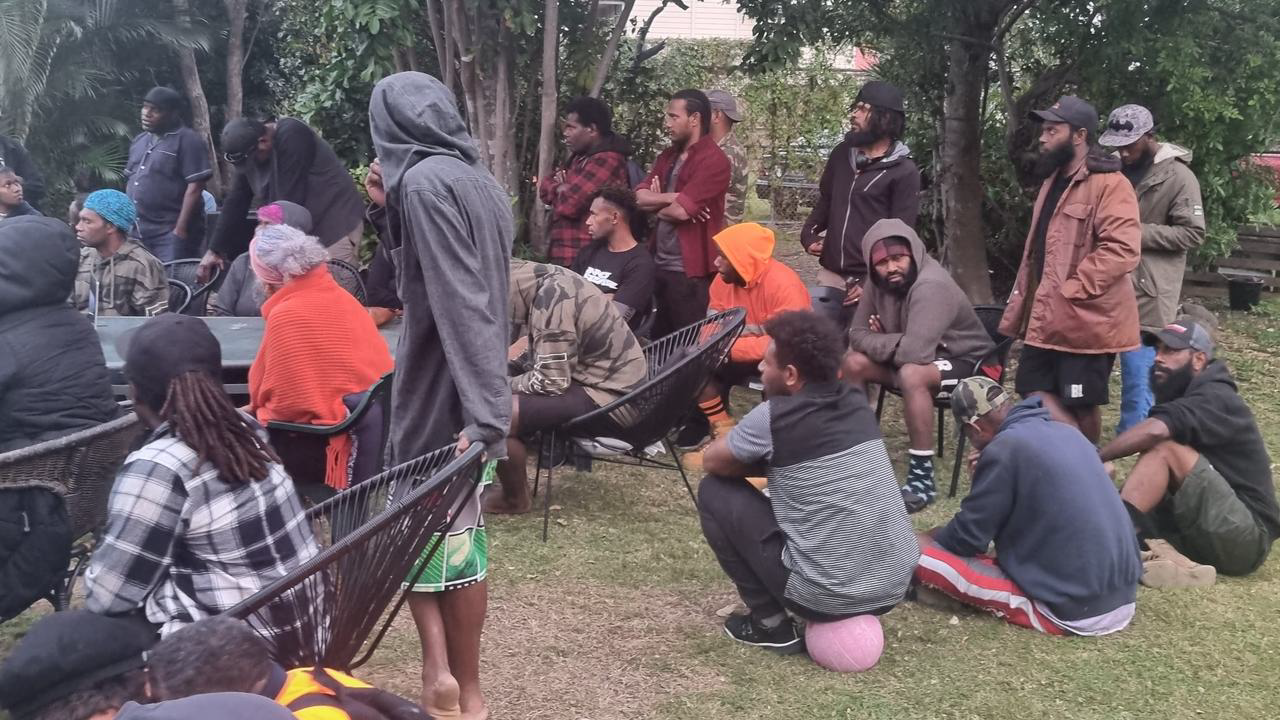
An officer from the Department of Foreign Affairs and Trade Office of the Pacific spoke to frustrated South Sea Islander workers about their issues with the scheme at the Bundaberg motel on June 26, 2022.
South Sea Islander man, Pako, said the meeting “did nothing” for workers still waiting for an outcome on the meeting.
“It has been a month and nothing has changed,” he said.
HOW ALLEGED MISTREATMENT WAS UNCOVERED
Motel manager Amanda Morris started to explore the struggles being faced by South Sea Islander workers who were staying at her accommodation.
When the workers voiced their concerns to the motel manager, a qualified accountant, she gained their permission to view their payslips to determine what “costs” were being taken from their pays by their contractor to cover “flights” and “visa costs”.
The workers came to Australia on the PALM and SWP Program, which allows eligible Australian businesses and labour hire firms to hire workers from nine Pacific islands and Timor-Leste.
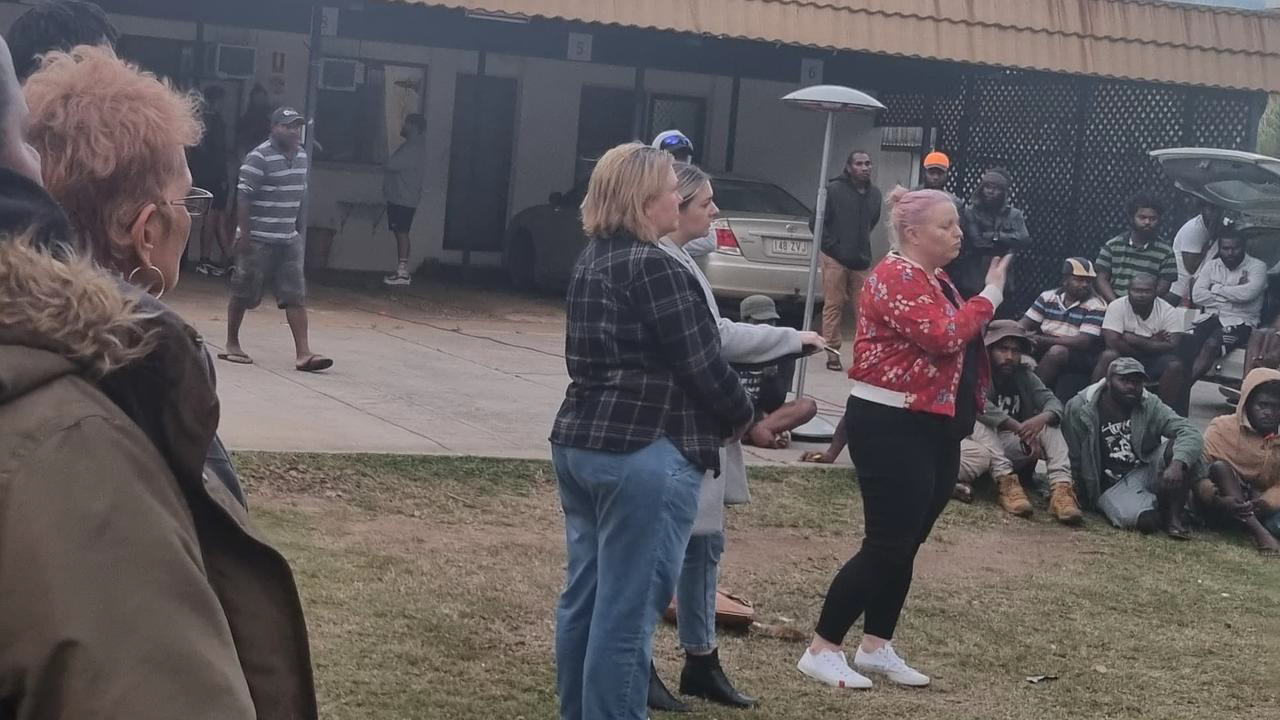
She said she found evidence of these costs being taken from the pays of South Sea Islanders by the firm, which was not an approved employer under the PALM Scheme.
“The workers were promised regular work, better pay and a long term protection visa in order to leave their sponsors, neither of which eventuated,” Ms Morris said.
Instead, it’s alleged the workers have been subjected to debt bondage, indentured labour and what amounts to human trafficking.
The company was contacted for comment but no response was given by the deadline.
It is claimed the company asked workers to hand over all of their travel documents which included visas, passports and logins, so that they could apply to have their visas changed from the 403 visa to a “protection visa” for which they are ineligible, and where unauthorised deductions were taken from their pays.
She claimed the farm workers initially arrived in Victoria and were sold protection visas which are usually $40 for the application, but workers were allegedly charged upwards of $2000 each to lodge the application.
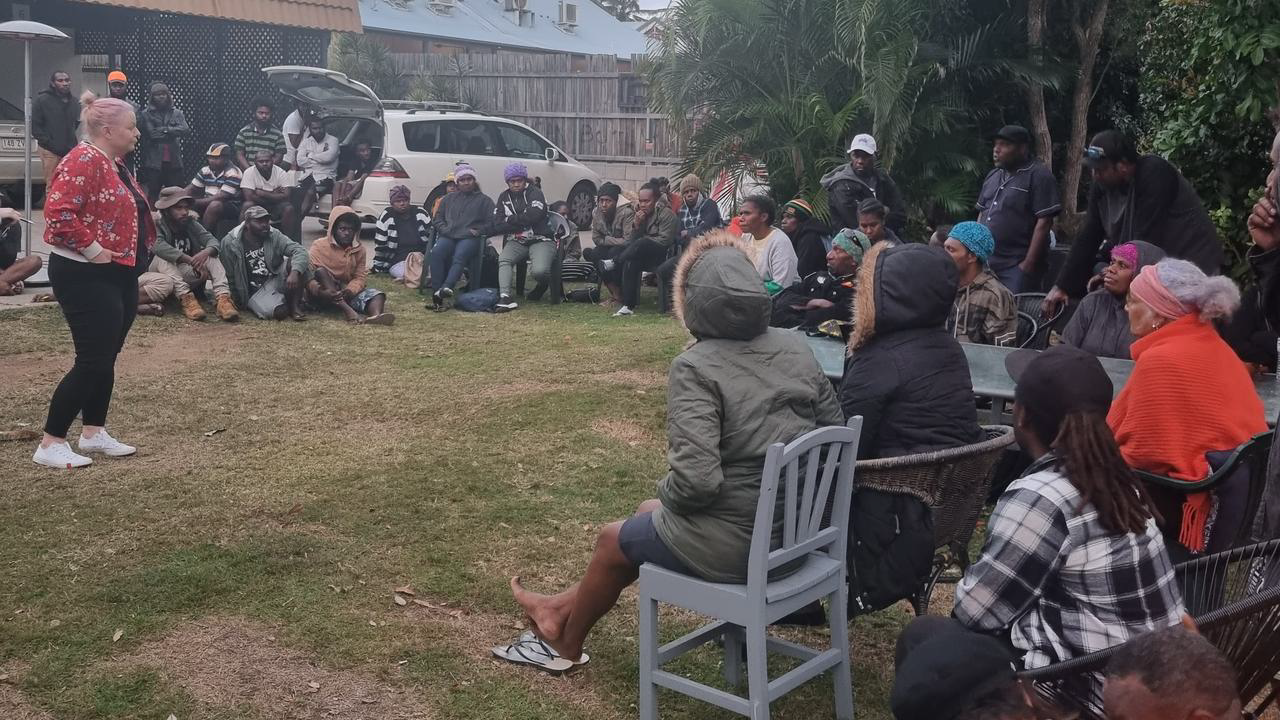
The workers were sent to farms across Queensland, New South Wales and Victoria to work.
Many paid cash for visas and said they were not given a receipt.
The immigration firm which allegedly facilitated the visa process was contacted for comment but no response was given by the deadline.
It’s alleged the workers were then locked out of their IMMI accounts and unable to access them until the local business woman and her staff members helped them regain access or set up new accounts.
It’s alleged they also found the same company had been working with several Australian farms to supply South Sea Islander men and women to farms illegally under the visa they are ineligible for.
The shocking claims began to emerge when Bundaberg motel manager found her guests were working for Bundaberg farms who had been employing islanders from the same company.
She then contacted the Department of Foreign Affairs and Human Rights Law Firm Levitt Robinson to help the workers rejoin the program.
Levitt Robinson has called on the Department of Foreign Affairs to act immediately so workers can make their way back to an approved employer.
“Approximately 50 participants in the Pacific Australian Labour Mobility Scheme have sought urgent assistance to have their visas restored under the PALM Scheme – after having been induced by an unscrupulous non-Approved Employer… to ‘abscond’ with the promise of ‘more work’ and ‘better pay’,” a spokesperson for Levitt Robinson said.
“The ‘work limitation’ condition attached to all visas under the PALM Scheme, prohibits holders from sourcing alternative and/or additional employment, and the limitation applies, even where the ‘new’ employer is also an Approved Employer under the Scheme and exploitation.
“According to the Commonwealth agencies responsible for the administration of the PALM Scheme, the work limitation condition is necessary to “protect vulnerable migrant workers from exploitation”.
“Indeed this cohort is particularly vulnerable having very limited levels of Indeed, this cohort is particularly vulnerable, having very limited levels of English proficiency, and no knowledge of Australian employment law or practice. However, the condition has the opposite effect, with worker often off-work for long periods of time, and insufficient earnings to cover overheads, leaving them open to unscrupulous non-Approved Employer to encourage workers to ‘abscond.’
“DFAT and the PLF were both informed of the workers’ plight a month ago – they are all now without work, a valid visa, and are practically unable to navigate their way back to a PALM approved Employer – and have not, as far as we know,offered any meaningful assistance.”
Around 50 Ni-Vanuatu workers staying in Bundaberg are believed to have been impacted by the alleged illegal operation, but it’s expected more will be uncovered.
The businesswoman said once word spread in the Bundaberg Islander community of the attempts to help the workers recover their money and rejoin the scheme, her small team were “inundated” with calls from absconders requesting help to re-join the program from all over Australia.
They have been working tirelessly to transfer every worker off the 408 or bridging visa and onto their original Pacific Labour Scheme visas, so they can be relocated to an approved employer and continue making money for the duration of their visa.

Contractor allegedly involved in PALM scheme rort
Originally published on couriermail.com.au written by Angeline Lowther
An interstate human rights law firm and Queensland motel manager have joined forcesto help vulnerable farm workers aft er the motel manager discovered her guests wereliving off a few dollars a week.
Ni-Vanuatu farm workers living and working in Bundaberg have sought urgent assistance to have their visas restored under the PALM Scheme after they claim they were induced by non-approved employment firm to work illegally.
It’s alleged an interstate-based contractor “exploited” the workers after they came to Australia to work and make money to send home to their families in Vanuatu.
At least 50 workers claim the contractor has “exploited” them.
South Sea Islander man, Alan, said the Bundaberg farmworker community felt like history had repeated itself, and they were being used like their ancestors who were blackbirded to Australia under false promises in the late 1800s.
“They were slaves,” he said.
“I just want to say that we are not robots, we are not slaves, we want to be treated like Australian people who work.”
HISTORY OF SOUTH SEA ISLANDER TREATMENT IN AUSTRALIA
“Blackbirding” first occurred from the year 1863 and was the term given to South Sea Islander men and women who were coerced, tricked and kidnapped and brought to countries distant to their native land to live a life of servitude under harsh conditions.
Many islanders died from living in poor conditions and forced into slave labour,with many rarely being fed, or only provided with tiny rations.
The Pacific Island Labourers Act was legislated in 1901, which made it illegal to import South Sea Islanders after March 1904.
The Australian Government welcomed islanders back through the Seasonal Worker Program (SWP) created in 2012 that would see them able to come to Australia for labour work.
After allegations of slave-lie conditions in the Queensland agricultural sector, the Australian Government introduced the Modern Slavery Act 2018.
HUSHED DEPARTMENT OF FOREIGN AFFAIRS TRIP TO BUNDABERG
Department of Foreign Affairs representatives swooped on the Bundaberg region in June 2022, after a local businesswoman made a complaint about the treatment of visiting workers.

An officer from the Department of Foreign Affairs and Trade Office of the Pacific spoke to frustrated South Sea Islander workers about their issues with the scheme at the Bundaberg motel on June 26, 2022.
South Sea Islander man, Pako, said the meeting “did nothing” for workers still waiting for an outcome on the meeting.
“It has been a month and nothing has changed,” he said.
HOW ALLEGED MISTREATMENT WAS UNCOVERED
Motel manager Amanda Morris started to explore the struggles being faced by South Sea Islander workers who were staying at her accommodation.
When the workers voiced their concerns to the motel manager, a qualified accountant, she gained their permission to view their payslips to determine what “costs” were being taken from their pays by their contractor to cover “flights” and “visa costs”.
The workers came to Australia on the PALM and SWP Program, which allows eligible Australian businesses and labour hire firms to hire workers from nine Pacific islands and Timor-Leste.

She said she found evidence of these costs being taken from the pays of South Sea Islanders by the firm, which was not an approved employer under the PALM Scheme.
“The workers were promised regular work, better pay and a long term protection visa in order to leave their sponsors, neither of which eventuated,” Ms Morris said.
Instead, it’s alleged the workers have been subjected to debt bondage, indentured labour and what amounts to human trafficking.
The company was contacted for comment but no response was given by the deadline.
It is claimed the company asked workers to hand over all of their travel documents which included visas, passports and logins, so that they could apply to have their visas changed from the 403 visa to a “protection visa” for which they are ineligible, and where unauthorised deductions were taken from their pays.
She claimed the farm workers initially arrived in Victoria and were sold protection visas which are usually $40 for the application, but workers were allegedly charged upwards of $2000 each to lodge the application.

The workers were sent to farms across Queensland, New South Wales and Victoria to work.
Many paid cash for visas and said they were not given a receipt.
The immigration firm which allegedly facilitated the visa process was contacted for comment but no response was given by the deadline.
It’s alleged the workers were then locked out of their IMMI accounts and unable to access them until the local business woman and her staff members helped them regain access or set up new accounts.
It’s alleged they also found the same company had been working with several Australian farms to supply South Sea Islander men and women to farms illegally under the visa they are ineligible for.
The shocking claims began to emerge when Bundaberg motel manager found her guests were working for Bundaberg farms who had been employing islanders from the same company.
She then contacted the Department of Foreign Affairs and Human Rights Law Firm Levitt Robinson to help the workers rejoin the program.
Levitt Robinson has called on the Department of Foreign Affairs to act immediately so workers can make their way back to an approved employer.
“Approximately 50 participants in the Pacific Australian Labour Mobility Scheme have sought urgent assistance to have their visas restored under the PALM Scheme – after having been induced by an unscrupulous non-Approved Employer… to ‘abscond’ with the promise of ‘more work’ and ‘better pay’,” a spokesperson for Levitt Robinson said.
“The ‘work limitation’ condition attached to all visas under the PALM Scheme, prohibits holders from sourcing alternative and/or additional employment, and the limitation applies, even where the ‘new’ employer is also an Approved Employer under the Scheme and exploitation.
“According to the Commonwealth agencies responsible for the administration of the PALM Scheme, the work limitation condition is necessary to “protect vulnerable migrant workers from exploitation”.
“Indeed this cohort is particularly vulnerable having very limited levels of Indeed, this cohort is particularly vulnerable, having very limited levels of English proficiency, and no knowledge of Australian employment law or practice. However, the condition has the opposite effect, with worker often off-work for long periods of time, and insufficient earnings to cover overheads, leaving them open to unscrupulous non-Approved Employer to encourage workers to ‘abscond.’
“DFAT and the PLF were both informed of the workers’ plight a month ago – they are all now without work, a valid visa, and are practically unable to navigate their way back to a PALM approved Employer – and have not, as far as we know,offered any meaningful assistance.”
Around 50 Ni-Vanuatu workers staying in Bundaberg are believed to have been impacted by the alleged illegal operation, but it’s expected more will be uncovered.
The businesswoman said once word spread in the Bundaberg Islander community of the attempts to help the workers recover their money and rejoin the scheme, her small team were “inundated” with calls from absconders requesting help to re-join the program from all over Australia.
They have been working tirelessly to transfer every worker off the 408 or bridging visa and onto their original Pacific Labour Scheme visas, so they can be relocated to an approved employer and continue making money for the duration of their visa.

